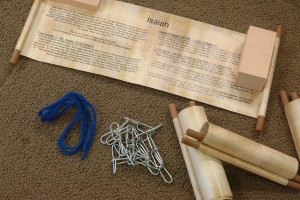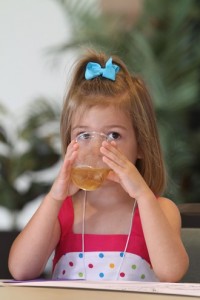What is Godly Play?
The goal of Godly Play is to teach children the art of using religious language – parable, sacred story, silence and liturgical action – to help them become more fully aware of the mystery of God’s presence and direction in their lives.
What makes Godly Play distinctive?
In Godly Play, we tell Bible stories to children to encourage them to enter in to the stories and relate them to their personal experience. Godly Play is concerned with the spiritual development of each child as an individual and with modeling the appropriate moral behaviors expected of people living within a Christian community.
Why are children asked to "get ready" before entering a Godly Play classroom?
The Godly Play classroom is sacred space for children. It is a place where children are encouraged to engage in “deep play” with scriptural materials. It is a place of silence,  mystery and wonder. Children are always helped to “get ready” before entering. A greeter or door person waits at the door to help each child become ready to enter the room. This helps them participate fully with the community of children in the classroom. A child who arrives late will be admitted as soon as this can be accomplished without disturbing the circle of children.
mystery and wonder. Children are always helped to “get ready” before entering. A greeter or door person waits at the door to help each child become ready to enter the room. This helps them participate fully with the community of children in the classroom. A child who arrives late will be admitted as soon as this can be accomplished without disturbing the circle of children.
Who are the two teachers in each classroom?
The two co-teachers each has a different role, and both are vital to the smooth functioning of the classroom. The greeter acts as a host or hostess for the classroom, ensures children are ready to enter and supports them in their work. The storyteller presents the lesson, supports the circle of children in their wondering and choosing their work and blesses each child before he or she leaves.
In a Nutshell: The Godly Play Philosophy
 About Children
About Children
- Children already have a spiritual life of a depth that we may not understand.
- Children can be given the gift of religious language that will allow them to express their spiritual experiences.
- Children are treated seriously and with deep respect; it should never seem to them that we see them as “cute” or as objects for our amusement.
About Children’s Work
- Children’s play is their work.
- Children are encouraged to choose their own work.
- Children like to work when it is work they have chosen for themselves.
- Teachers do not interfere with the children’s work unless the child asks for help.
- When a child seems unable to ask for assistance, it should be offered by the adult.
- Part of the work of the community of children is the care of their own classroom.
- Children like to feel self-sufficient; it is good to allow them the opportunity to clean up their own spills and put away their own work.
About Teachers and Children
- Teachers are guides. They do not need to have all the answers.
- Children have much to teach adults who take the time to listen.
- Children are encouraged to do the work of finding their own answers.
- When a teacher takes time to listen to and observe a child, the teacher can find more effective ways to lead the child into new discoveries.
About the Church School Environment
- The Godly Play classroom is a place for children:
- To be themselves
- To learn how Christians live in community
- To come closer to the mystery of God’s presence
- Respect for the space and for one another is maintained in a Godly Play Classroom to help children feel safe.
- A Godly Play classroom should help each child feel successful.
 About Enabling a Community of Children to Develop
About Enabling a Community of Children to Develop
- In Godly Play, children are encouraged to form their own community and take care of one another.
- A class room is not “over grown-upped.” This allows children to form a community and empower them to be in control of their space. It also keeps the storyteller and doorperson focused on the children and their work.
Learn more about the Godly Play Foundation HERE.